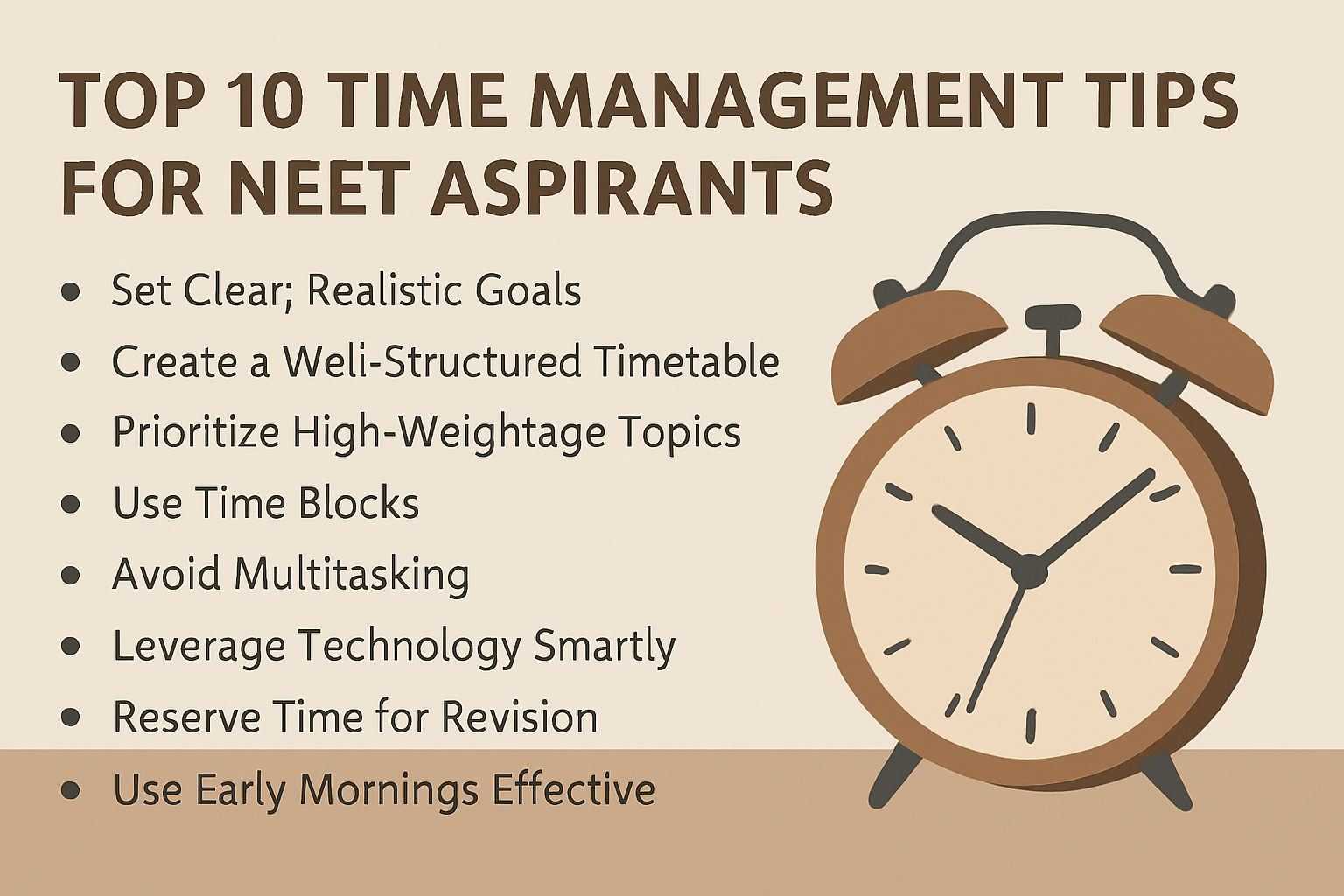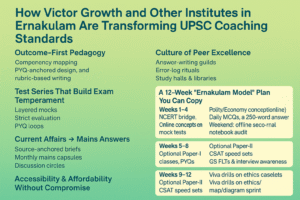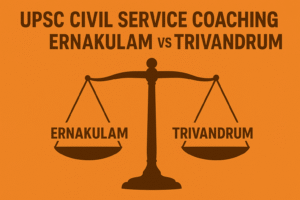Time management is the backbone of successful NEET preparation. With a vast syllabus and intense competition, aspiring doctors must learn to use every hour effectively. If you master time management early, you will reduce stress, improve retention, and boost your performance. This comprehensive, SEO-friendly guide will walk you through the top 10 time management tips for NEET aspirants, along with practical examples and FAQs to help you plan your journey strategically.
Why Time Management Matters in NEET Preparation
Extensive Syllabus: NEET covers Class 11 and 12 NCERT for Physics, Chemistry, and Biology.
Limited Time: Most aspirants have 1–2 years to prepare.
High Competition: Over 20 lakh candidates compete for limited MBBS seats.
Balanced Focus: You must juggle school boards, coaching, and NEET-specific practice.
Effective time management ensures you cover the entire syllabus with ample time for revision and mock tests.
Top 10 Time Management Tips for NEET Aspirants
1. Set Clear, Realistic Goals
Break your preparation into milestones:
Daily Goals: Specific targets like completing a topic or solving 50 MCQs.
Weekly Goals: Finishing a chapter or mastering a concept.
Monthly Goals: Covering an entire unit or revising completed portions.
Example:
“I will finish Human Physiology by the 20th of this month.”
2. Create a Well-Structured Timetable
Your timetable must be:
✅ Practical
✅ Flexible
✅ Balanced between school, coaching, and self-study
Tips:
Reserve 6–8 hours daily for focused study.
Allot fixed slots for revision and practice tests.
Include short breaks to maintain energy levels.
3. Prioritize High-Weightage Topics
Don’t treat all topics equally. Focus first on:
Biology: Genetics, Human Physiology, Plant Physiology
Chemistry: Organic and Physical Chemistry basics
Physics: Mechanics, Electrodynamics
Prioritizing these ensures you cover the maximum scoring areas early.
4. Use Time Blocks
Follow the Pomodoro Technique:
Study for 50 minutes
Take a 10-minute break
Repeat
This approach prevents burnout and increases focus.
5. Avoid Multitasking
Focusing on one subject or topic at a time improves efficiency. Don’t switch between Physics problems and Biology diagrams in the same session.
6. Leverage Technology Smartly
Use tools like:
Study Apps: Notion, Evernote for notes
Pomodoro Timers: Forest App
Question Banks: Embibe, Aakash, Allen platforms
But avoid distractions—mute notifications during study time.
7. Reserve Time for Revision
Follow the 3-1-7 Rule:
Revise 3 days later
Revise again after 1 week
Revise again after 7 weeks
Regular revision improves long-term retention.
8. Take Mock Tests Regularly
Frequency: Start with 1 mock test monthly, increase to 1 per week in later stages.
Timing: Attempt them in actual exam slots (2 PM – 5:20 PM).
Analysis: Spend time reviewing mistakes after each test.
9. Use Early Mornings Effectively
Morning study sessions are ideal for learning complex topics due to higher concentration.
Tip: Reserve early hours for Physics and Chemistry problem-solving.
10. Rest and Recharge
Time management isn’t about studying non-stop. Adequate rest helps avoid fatigue and improves memory.
Sleep 6–8 hours daily.
Take short breaks after long study sessions.
Engage in light exercise or hobbies to refresh your mind.
Sample Daily Schedule for NEET Aspirants
| Time | Activity |
|---|---|
| 5:30 AM | Wake up, freshen up |
| 6:00 – 8:00 AM | Physics practice & problem-solving |
| 8:00 – 2:00 PM | School/Coaching |
| 2:00 – 3:00 PM | Lunch & rest |
| 3:00 – 5:00 PM | Chemistry theory + MCQs |
| 5:00 – 6:00 PM | Break/Exercise |
| 6:00 – 9:00 PM | Biology NCERT reading & notes preparation |
| 9:00 – 10:00 PM | Revision of the day’s work |
| 10:30 PM | Sleep |
Adjust this routine based on your school timings and personal rhythm.
FAQs – Time Management for NEET Aspirants
Q1. How many hours should I study daily to crack NEET?
A: Ideally, 6–8 hours of focused study outside school/coaching hours. Quality matters more than quantity.
Q2. Can I manage NEET preparation with school boards?
A: Yes. Both share the NCERT syllabus. Effective planning helps you prepare for boards and NEET simultaneously.
Q3. When should I start giving mock tests?
A: Start once you finish at least 40–50% of the syllabus. Early practice builds confidence.
Q4. Is it okay to take breaks while studying?
A: Absolutely. Short breaks improve focus and prevent burnout.
Q5. How can I stay motivated during preparation?
A: Set small, achievable goals, reward yourself after completing targets, and remind yourself why you started.
Conclusion
Mastering time management will transform your NEET preparation. Start early, set realistic goals, and stick to your timetable. Remember—discipline, consistency, and smart work will make you stand out in the competition.







